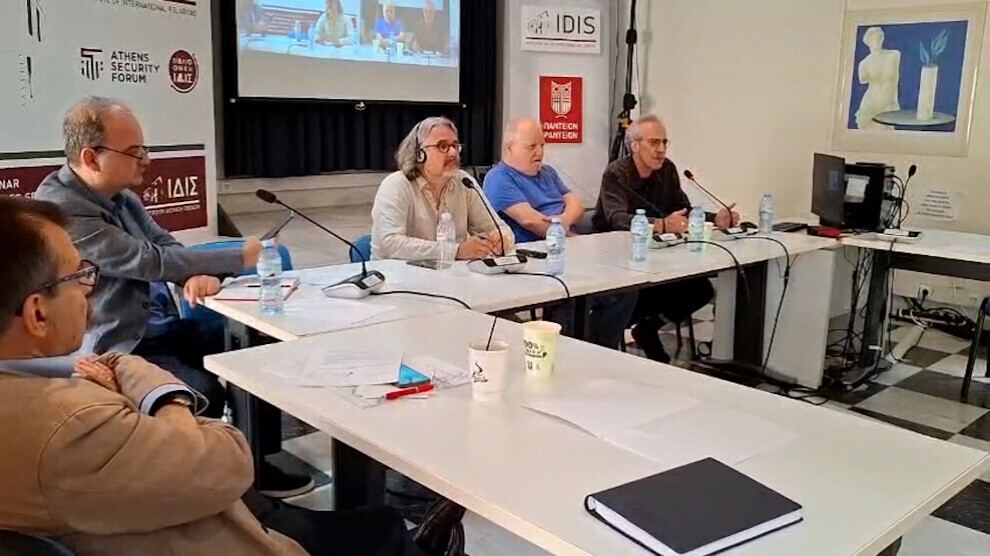Ilham Ehmed at Athens conference: Syria is facing the possibility of a civil war and a major crisis
“The Kurdish Question and Developments in the Middle East” conference in Athens continues with speeches.
“The Kurdish Question and Developments in the Middle East” conference in Athens continues with speeches.

The conference on “The Kurdish question and developments in the Middle East” continues in Athens. The conference is attended by PYD (Democratic Union Party) Co-Chair Xerîb Hiso, Îlham Ehmed, Co-Chair of the Department of Foreign Relations of the Democratic Autonomous Administration of North and East Syria (DAANES), Sema Begdaş, Co-Chair of the PYD Diplomatic Relations Office, as well as numerous academics, politicians, and journalists.
Call for support for the Kurds
After the lunch break, former Greek Foreign Minister Nikos Kotzias delivered a speech.
Kotzias stated that all countries should support the Kurds, who are one of the few peoples in the Middle East who are not fanatical about religion.
“There are those who say that they want to help the Kurds, but Turkey will be upset by this. Turkey can be upset if it wants to. Everyone should help the Kurds because they are striving for democratic rule in the Middle East,” said Nikos Kotzias, calling on the Greek government to support the Kurds to the end.
The second session focused on discussions about the Democratic Autonomous Administration of Rojava and the regional influence of Abdullah Öcalan. The session was moderated by Loannis Albanis.
Journalist Stavros Lygeros pointed out that the Turkish state is pursuing a Neo-Ottomanist agenda that includes the Kurds: “The Turkish state's efforts to assimilate the Kurdish people have come to a definitive and irreversible end.”
Journalist Petros Papakonstantinou said that despite all the obstacles posed by the Turkish state, the Kurds have taken major steps forward in Syria.
Following the speeches, the second session came to an end.
‘Syria is facing the possibility of a civil war and a major crisis’
Speaking after the break, Ilham Ehmed, Co-Chair of the Department of Foreign Relations of the Autonomous Administration of North and East Syria, drew attention to the conflicts in Syria and said, "There has been a long war in Syria, and much blood has been shed. After the fall of the Baath regime, economic problems and pressure to convert women to radical Islam increased, and this issue has not been resolved. Syria is facing the possibility of civil war and a major crisis. Additionally, HTŞ is making decisions independently and not collaborating with the people."
Ehmed warned that the Syrian people will face the threat of jihadist groups and ISIS mercenaries in the coming days if government institutions are not reformed. She emphasized that Syria is made up of many peoples and faiths and cannot be reduced to a single language or a single faith. Ehmed also warned that insisting on centralizing power in Syria could lead to a major civil war and many communities may decide to act independently.
'The solution is the autonomous administration model'
Ilham Ahmed said that many countries have lifted sanctions on Syria but are waiting for a democratic and inclusive government to be formed in Syria. She drew attention to the increasing pressure on women by jihadist mercenaries, the gradual disregard for women's rights, and attempts to establish a new order, emphasizing that the solution to the problems across Syria lies in the autonomous administration model.
Referring to their talks with the Damascus regime, Ilham Ehmed emphasized that security, the economy, and the education system must be local. Stressing that a return to the Baath regime system is impossible and that an autonomous system is necessary, Ehmed stated that the threat of ISIS is still alive and that the most important force against this threat is the Syrian Democratic Forces (SDF).
Ilham Ehmed said that the process initiated by Abdullah Öcalan would affect them and the region. According to her, Öcalan’s views are vital and that the issue should be resolved at the negotiating table.
Finally, Ilham Ehmed pointed out that legal and democratic steps should be taken following the 12th PKK Congress and that the process should continue in accordance with the legal framework.
The final session of the conference will focus on regional powers and the Kurdish issue. Moderated by Sotiris Roussos, the session will feature Prof. Konstantinos Filis, Stavros Drakoularakos, Lecturer at the University of Nicosia, and Kamal Chomani, Academic at the University of Leipzig. The conference will conclude with a closing speech by Sema Begdaş, Co-Chair of the PYD Diplomatic Relations Office.